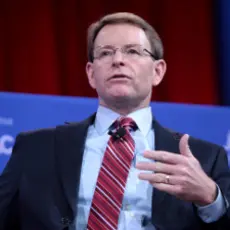Americans United for Life has sent a letter to the Senate demanding exhaustive hearings on President Obama's nominee to replace Justice David Souter:
When the Senate Judiciary Committee gathers to hold hearings on a Supreme Court nominee, one pro-life group tells the panel's chairman it wants a full discussion of where the nominee stands on abortion. The letter comes from Charmaine Yoest, the president of Americans United for Life.
"The most important question a nominee for the Supreme Court must answer is to articulate their judicial philosophy: will they advance an agenda that limits the right of the people to determine the content of abortion-related laws through the democratic process?" she writes.
"In the days ahead, we look to our Senators to uphold their duty to raise serious questions on the nominee’s judicial philosophy and reject any nominee who places personal preference over upholding the Constitution," the AUL leader adds.
Should her organization not like the answers, Yoest promises an immediate response.
"We will oppose any nominee to the Court who believes social activism trumps interpreting the Constitution," she says.
David Weigel of the Washington Independent profiles several of the right-wing judicial activist groups:
Curt Levey sometimes wears a lapel pin with the faces of Justices John Roberts and Samuel Alito and the legend “Thanks, W.” Once in a while he swaps that out for another button, with the same portraits of George W. Bush’s two high court appointments, but a more forward-looking slogan: “The kind of change we can believe in.”
“I used to work to confirm good judicial nominees,” Levey told TWI this week. “Now I’m trying to limit the damage Barack Obama can do.”
Levey is the executive director of the Committee for Justice, one of the hubs of a far-flung but close-knit group of conservatives who plan on holding President Barack Obama’s first Supreme Court pick up to a magnifying glass. During the Bush years, Levey worked at the Center for Individual Rights, a libertarian law firm that made its biggest impact with the landmark Gratz v. Bollinger and Grutter v. Bollinger affirmative action cases. Levey went on to the Civil Rights Division of the Department of Justice, then left to work on Supreme Court confirmations with conservatives who had prepped for these fights ever since the failed 1987 nomination of Judge Robert Bork.
Movement conservatives are in a position to oppose the nomination of almost any nominee that the president puts forward. In conversation with TWI, activists portrayed the coming confirmation hearings as a chance to peel the bark off of the president’s bipartisan image, to unite the conservative movement, and to learn lessons for future hearings with higher stakes. Few imagined that the president could get a much more liberal pick than retiring Justice David Souter through the Senate. Their focus was not so much on defeating this pick — an incredibly difficult task with only 40 Republican senators — but on carving out an election issue for the 2010 midterms and on building capital for a theoretical future battle to replace one of the court’s conservatives.
“This can be an educational moment for the American people,” said Gary Marx, the executive director of the Judicial Confirmation Network. “This is a chance to reaffirm the meaning of judicial restraint and explode the myth that Barack Obama is trans-partisan leader.”
They have some strength in numbers. While Levey cautioned that “the groups on the right are smaller than the groups on the left,” such as People for the American Way, he put together one of the first intra-movement conference calls on the coming Supreme Court fight days after the 2008 election, bringing on around 50 people. In the months since, he has collected around 30 short dossiers (averaging three pages each) on possible Obama nominees. The quiet coalition that’s ready to scrutinize Obama’s nominees includes several people who faced Democratic wrath during the Bush years, such as Tim Goeglein, a former White House aide who is now a vice president at the political arm of Focus on the Family, and Manny Miranda, a one-time aide to former Sen. Bill Frist (R-Tenn.) who spent the Roberts and Alito confirmation battles at the head of his own effort, the Third Branch Conference.
“A lot of the old Bush people went on to law firms,” Levey explained. “No one group has the resources to do 30 research memos, but by pooling out work to people and recruiting pro bono help, we’ve got more than we need at this point.”
Finally, there is lots of speculation about how Republicans and the Right would respond to a gay SCOTUS nominee, with Sen. Jeff Session saying that it wouldn't be "an automatic disqualification" while Sen. John Thune is not so sure:
“I know the administration is being pushed, but I think it would be a bridge too far right now,” said GOP Chief Deputy Whip John Thune. “It seems to me this first pick is going to be a kind of important one, and my hope is that he'll play it a little more down the middle. A lot of people would react very negatively.”
The interesting this about Thune's statement is that it sounds an awful lot like the statement Tony Perkins made earlier this week:
"I think that would be a bridge too far for him to be honest because that would enter a whole new element into the debate that I don't think he's ready for," said Tony Perkins of the Family Research Council. "A parallel to that would be Bill Clinton's gays in the military battle, which really hurt his agenda from that point forward."
Perkins said his group would not investigate anyone's sexual preferences and planned to focus on a nominee's judicial views. "The issue is the ideology," he said.






